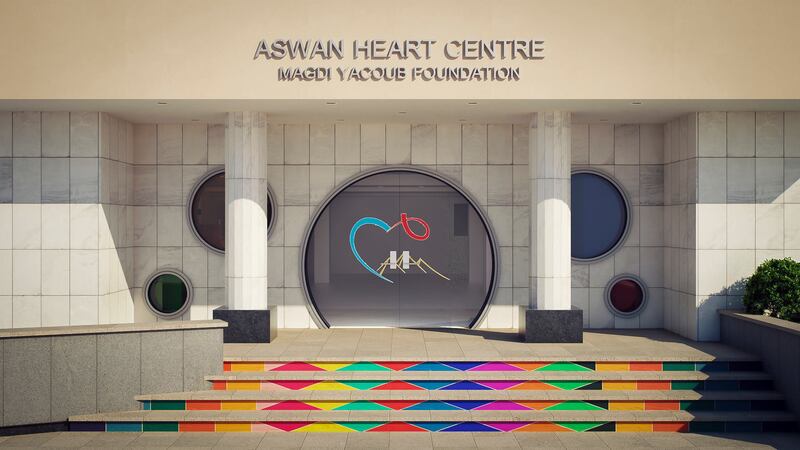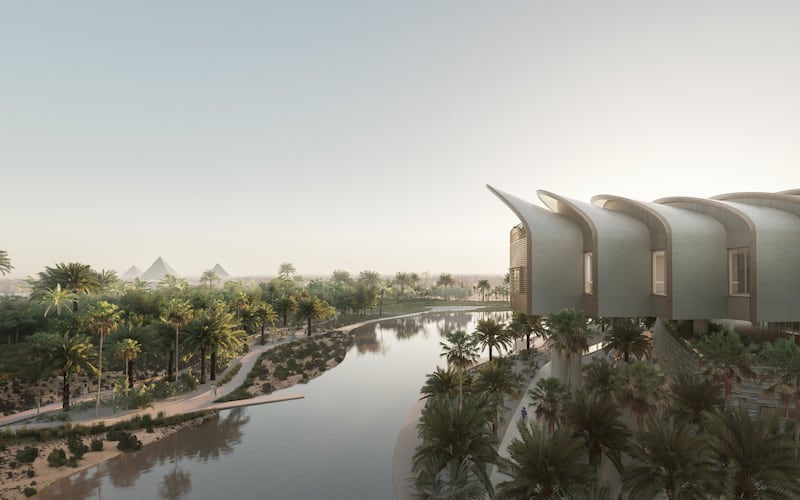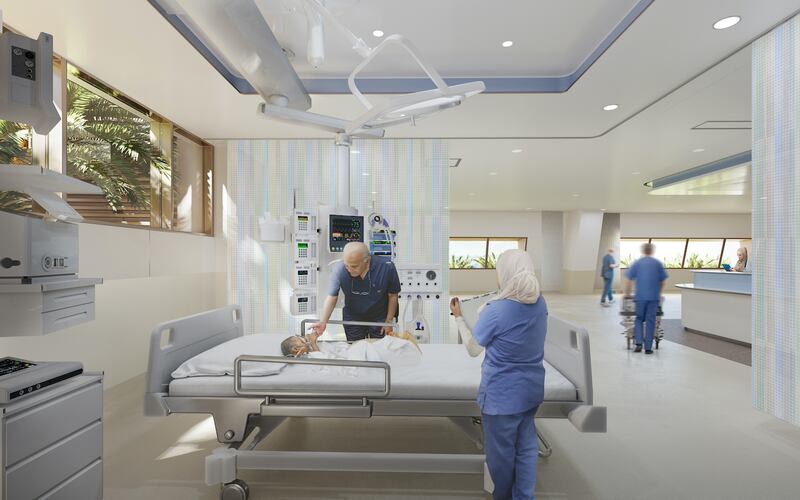It is not often that Prof Sir Magdi Yacoub finds himself as the patient prone on an operating trolley looking up into the face of a surgeon instead of being on the other side of proceedings.
The scenario, though, played out recently when the pioneering cardiothoracic specialist went under the scalpel to have his left hip replaced after slipping while pushing a luggage cart through Rome’s Fiumicino airport.
Yet Yacoub, 87, who has arguably touched more hearts with his “magic hands’’ than anyone else in the world, was not the least bit perturbed by the reversal in positions of trust.
“It's a privilege, almost, to be at the receiving end,” he tells The National. “It is a massive responsibility, the patient-doctor relationship. I consider it sacred. It's very important for me to know how patients feel. Sometimes we take it for granted.”
The injury occurred when, delayed by a throng of admirers keen to take a selfie with the Egyptian-born heart surgeon known affectionately as “Prof’’, he was rushing to reach passport control.
“I always say that people think of surgeons as heroes. We're not at all. We are applying what is, in effect, a very noble profession, to the community,” he says. “And the community thinks that we're fantastic. We are just the vehicle.”
Diagnosis of the fracture that led to the surgery in London took two weeks, the most painful period in Yacoub’s long memory, leaving him so discombobulated by painkillers that “it made me wonder if I wanted to live any more”.
Fast forward seven weeks from the operation and he has just returned from Egypt after one of his regular trips to the heart centre he founded in Aswan, having been passed fit to travel thanks to a rigorous regime of physiotherapy.
When we met last month, he was walking with the aid of crutches into his office at Harefield, the former village hospital in Hillingdon that over decades he transformed into a transplant centre of international renown.
Asked about success, Yacoub modestly puts much of his own down to P, P and H. “Passion,” he says, by way of explanation. “You should really believe in what you’re doing.

“Second P: Persistence. And, finally, H for humility, because humility is very important in being able to talk to the most desolate patient or individual on planet Earth, or to royalty or the most intelligent person. You have to be humble.”
Despite his best efforts to throw off the heroic mantle, he is nonetheless internationally revered; nowhere more so than in the land of his birth where a mural in the Nile delta province of Sharqia immortalises Egypt’s two favourite, albeit contrasting, sons, Yacoub and footballing great Mo Salah.
“I am uncomfortable with the attention,” he says. “I'm only doing my duty. I am a very ordinary man who loves his family, loves food, loves life, but equally takes his job very seriously.”
He continues to drive forward the search for novel treatments and techniques in the state-of-the-art on-site laboratories at The Magdi Yacoub Institute.
There, scientists are hard at work trying to grow living heart valves and organs from a scaffold of stem cells, and explore the potential for gene editing to combat cardiac failure.
“I feel more and more enthusiastic the more I learn,” he says. “I always look forward to the next day to find out what new things I can think about.”
As the conversation turns to the subject of A Surgeon and a Maverick, his authorised biography, a line of commendations, mementoes, photographs and statuettes on a windowsill stands testament to the distinguished life he has led.
One figurine is particularly conspicuous: a rendering of Imhotep, known as the first physician, a non-royal Egyptian belatedly deified for his skills as a healer centuries after he died circa 2611 BC.

That Yacoub considers him inspirational should come as no surprise to anyone familiar with the ups and downs of his own journey to eventually become recognised as a world-leading cardiothoracic surgeon and prolific transplanter of hearts.
When the title of the book was first posited, he admits to having had to look up the word maverick in the dictionary to fully appreciate what it meant. The definition of an unorthodox or independent-minded person “appealed to me”, he says with a smile that acknowledges he has always done things his own way.
To Yacoub, advances in medicine are possible only by taking risks, and for the most part he has been vindicated. He has been responsible for many firsts: one of the first switch operations to save babies born with their aortic and pulmonary arteries the wrong way round; Europe’s first heart-lung transplant in 1983; the world’s first “domino” heart transplant in 1987; the first living lobe transplant for a cystic fibrosis patient in the UK in 1995; and developing innovative operations for many complex congenital heart anomalies.
Ismail El-Hamamsy, a former PhD student of Yacoub’s and now director of aortic surgery at New York’s Mount Sinai Hospital, said: “He tends to go to places that others fear to tread.”

There were those, such as Kenneth Clarke, who when Britain's secretary of health under prime minister Margaret Thatcher, branded him the “mad surgeon at Harefield”.
“They used to call me the controversial doctor who has no ethics, experimenting on patients and doing transplantation,” Yacoub recalls. “If you're crossing the boundary, you go out into an area which has not been charted before.”
Asked if the approach required bravery, he talks about a book on the subject written by Gordon Brown in which the chancellor of the exchequer defined courageous people as those who do the right thing against the odds when far less harmful alternatives are open to them.

He was born in Belbeis, a remote village on the banks of the River Nile, to Coptic Christian parents Habib, a general surgeon, and Madeleine, a judge’s daughter whose accomplishments included playing piano and painting oils on canvas.
At the age of five, the young Magdi pledged himself to become a surgeon after the untimely death of his beloved aunt Eugenie, aged 22, from rheumatic heart disease. Yet when he was first at school he appeared to pay no attention and refused to participate.
The teachers for years thought he had significant learning difficulties because of his reticence. Asked once why he didn’t talk, he answered: “Because I’ve got nothing to say.”
An itinerant life following his father around the country taught him the need to be adaptable and that interactions with different people can bring great enjoyment. They were lessons that would stand him in good stead.
He was accepted into medical school in Cairo on scholarship at the age of 15, and another formative experience came when he fainted while observing a thyroid operation being performed by his surgeon uncle. “He started cutting the neck,” Yacoub says.

“There was bleeding everywhere. To me, it looked uncontrollable, and I suddenly just could not face it. I was going to the floor, and they all said: ‘Ha, ha, ha. You want to be a surgeon?’
"Later on, I discovered why. I have to feel I am in control. Then, I can stop anything. I can modify my techniques in any way.”
After a three-year residency in general surgery at Cairo University Hospital, Yacoub set sail from Alexandria for London in 1961, where he worked with Prof Sir Russell Brock, one of Britain’s leading heart surgeons, and Donald Ross, who carried out the first heart transplant in the UK seven years later.
But his progress was stymied by the unwritten rules of the British medical establishment, with its nuances of language and old boys’ network. Hard for him to fathom and, he felt, a waste of time away from his patients, they were to prove costly, too.
Either because Yacoub could not or would not play the game, he missed out on a senior role at North Staffordshire Royal Infirmary and then, more devastatingly, the post of consultant cardiothoracic surgeon at the Royal Brompton to replace Lord Brock.

Yacoub opted to spend a year at the University of Chicago as an assistant professor.
During this time, he married Marianne Boegel, known to him as Anne, a German nurse with a penchant for flared trousers who he met at the Brompton. The couple went on to have three children – Andrew, now an estate agent; Lisa, who works for Chain of Hope, the charity her father founded, and co-ordinates the evolution of the Rwanda Heart Centre in Kigali; and Sophie, a physician in infectious diseases and tropical medicine.
His experiences in the United States were to inform the way he later developed the cardiac unit when he returned to the UK at Harefield.
But America’s loss was to be the UK’s gain when the disillusionment that Yacoub felt about the health system there confirmed him as a champion of the NHS. Despite inherent problems in the country’s biggest state employer, he still holds up the National Health Service as a beacon for the world, and strongly disagrees with ongoing strike action by consultants, junior doctors, nurses and ambulance workers as almost a betrayal of the Hippocratic oath.

“I'm totally dedicated to it,” he says. “I adore it. It feels a good thing for my patients to know that I will never, never go on strike for whatever reason because the NHS is by far the best system both in the developed but obviously in the developing world."
At the peak of his powers, Yacoub’s work rate was prodigious, leaving the rest of the team at Harefield trailing exhausted in his wake. It was not unusual for him to undertake 16 operations a week late into, and sometimes through, the night, with the reward at the conclusion a takeaway tandoori chicken curry and a few hours’ snatched sleep before returning to his desk to throw himself into more research.
He has rubbed shoulders with the rich and the famous, and on occasion even saved their lives, among them Eric Morecambe (heart bypass), one of Britain’s greatest comedians, the Egyptian actor Omar Sharif (triple heart bypass), and the Greek Prime Minister, Andreas Papandreou (aortic valve surgery).
His relationship with the British royal family runs deep. Opposite the window in his office are the chairs where Diana, Princess of Wales, a great supporter and ardent friend of Yacoub’s, used to sit to give comfort and inspiration to some of the youngest and most ill patients.

“I would go on my midnight rounds and hear giggles, and I knew exactly what that meant,” Yacoub says, trying and failing to feign disapproval. “She’d be in the ward talking to the children!
“I would say to her, ‘What are you doing? It’s midnight. Do you have security?’
“‘No, I drove myself.’
“‘Oh, my goodness,’ I’d say. ‘Will you be safe?’
‘She said: ‘It’s OK – I'll ring you when I get home!’”
Diana had, he says, a passion for helping others, “and people realised that. They are not stupid. They felt that this princess, this People's Princess, actually did love them”.

Yacoub would like to think that her eldest son might one day consider carrying on her involvement in some kind of capacity with his continuing work and charities. “Of course I’d like that,” he says, “because William is like his mother.”
The reason that he has finally consented to an authorised biography now after all these years is not, he stresses, out of self-aggrandisement, but in the hope that it will inspire others to follow in his footsteps.
Long troubled by inequities in healthcare delivery around the world and the lack of availability for many people who probably need it most, he decided to take matters into his own hands after being forced into retirement by the NHS at the age of 65 in 2001.
“I wanted to continue. I sympathise with the idea that young people should be given a chance to lead, but that doesn't mean that experience of 40 or 50 years should be thrown to the ground.
“Out of a bad place, something very positive has come.
“I asked myself this simple question: ‘Why are we working day and night to find new things and new discoveries?’ And it dawned on me – it's less than 10 per cent of the population of the world who will benefit. That was totally unacceptable.
“It’s no good building something beautiful if you can't sustain it, and sustainability is knowing how to make it available to the poor and the desolate.”
Through The Magdi Yacoub Foundation, he set up a heart centre in Aswan in 2009 through which Chain of Hope is training doctors from across Africa; he helped to open the first cardiac centre in Ethiopia and another, with a research unit, in Mozambique; and is leading the development of the new heart centre in Kigali.
Next year, the Magdi Yacoub Global Heart Centre designed by Norman Foster will open in Cairo after Mohammed bin Rashid Global Initiatives, a charity foundation in Dubai, raised $24 million to support its construction for the provision of free care to patients across the Arab region.
“I have a strong belief that we are all the same,” Yacoub says. We should not have privileged people because of money, religion, power or whatever.“
Along the way, Yacoub has overcome much scepticism – not least that of his own father, who thought his son was too disorganised and had the wrong temperament to make a success of himself as a heart surgeon.
What is perhaps most striking about him are his hands, out of all proportion to the rest of him as he forms a pyramid with his fingertips in front of his weathered face.
“My hands are slightly bigger than usual,” he concedes. “But the co-ordination of the hands is very important. I have, from a very young age, tried to link my brain to my hands.”
In theatre, his surgical performance has been likened to that of a virtuoso conductor, with the methodical and calming strains of JS Bach invariably playing in the background. “I am the leader of the group,” he says, “and I have learnt from previous experience, where some of my chiefs used to start by saying, ‘This is a very difficult and dangerous operation.’ And guess what? It puts everybody on edge, and we ended up with a dead patient almost every time.

“Now, I start operations by saying: 'This will be an easy and safe operation. Everybody relax. Guys, let us play Bach. No small talk, though.'”
Yacoub shared his passion for classical music as well as gardening with his beloved Anne, who he lost to ovarian cancer in 2011, and still finds immersion in nature relaxing as he tends rare orchids and epiphytes – plants that grow harmoniously and harmlessly on other plants.
The allotment at his home near Harefield also contains apples, beans, raspberries and herbs, and help these days is provided by Haile, 21, an orphan from a remote Ethiopian village who owes his life to Yacoub.
Haile was operated on and treated for advanced rheumatic heart disease by the man he calls “Dad-Dad”. He was fostered by Yacoub’s daughter, Lisa, nine years ago and is studying to be a doctor so he can return to Sidamo, where there is no medical support.
If Yacoub has one great indulgence, it is fast cars. He started the love affair with a Lotus Elan Plus 2, enamoured of its torque, handling and elegance. Next was a Lamborghini Urraco Aramco, the windscreen of which he went through in an accident, nearly losing his life. Then there was a Maserati and, finally, a Ferrari Testarossa.

In 2011, Egypt awarded Yacoub the Order of the Nile. He was knighted by Queen Elizabeth in the New Year’s Honours of 1992, was awarded Fellowship of the Academy of Medical Sciences in 1998, made a Fellow of the Royal Society in 1999, received a lifetime outstanding achievement award by the Secretary of State for Health in the same year, and, in 2014, was appointed to the prestigious Order of Merit, which has only 24 members worldwide.
“I was an outsider and now outsider no more,” Yacoub says.
Being finally accepted into the fold has brought satisfaction, he says: “Having dinner with the queen and then the new king. I am moved to see how he is adopting exactly the same spirit as his mother. That of ‘service'.’’
Of his own continuing service, Yacoub feels an urgent need to impart everything he has learnt to the younger generation. There is, he says, an epidemic of heart failure affecting all ages and nationalities, the basic mechanisms of which are still unknown.
He feels as though the problem is only being treated on the surface but has faith that there are tools coming that will be effective in the future.
If that is the case, would he like to live for ever?
“It is a wish,” Yacoub says, playfully, “but it is against nature!”
Whenever he stands, the toll that dedication to his patients has taken becomes apparent. Countless hour after painstaking hour of stooping during surgery has diminished Yacoub’s height from just over 6ft at his tallest to barely 5ft 10in now.
“I have destroyed my back,’’ he says. "I have shrunk due to the years of operating.’’
That may well be so but in the eyes of the world Prof Sir Magdi Yacoub will always be a giant.
‘A Surgeon and a Maverick: The Life and Pioneering Work of Magdi Yacoub’, by Simon Pearson and Fiona Gorman (The American University in Cairo Press, £24.95), is available now. A percentage of royalties will go to the Magdi Yacoub Heart Foundation myf-egypt.org












